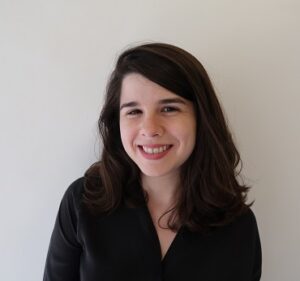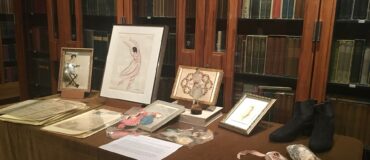By Carolina Meneses
Carolina Meneses is Dance/USA’s first Dance Archiving & Preservation Fellow. Her Fellowship, from July-September 2018, is hosted by UCLA Library Special Collections, and her practicum site is Lula Washington Dance Theatre. Read more about the Fellowship program here. This is the last of six posts from Carolina’s 2018 summer blog. Read the fifth part here.
December 11, 2018
“Most importantly, I haven’t grown tired of working with dance archives.”
When I was first selected as the inaugural Dance/USA Archiving Fellow, I had no idea what awaited me. I had the perception that I would simply build on the practical experience I had as an intern at the Trisha Brown Dance Archive, but it was so much more. I began to more concretely address what it means to preserve something as ephemeral as dance and especially to ask, to what end? In such a short time I’ve had the opportunity to work on a variety of projects that spoke to this question; I re-described a series of the Ruth St. Denis papers to improve user discovery; I participated in donor visits and UCLA Library Special Collections study groups; I attended Society of American Archivists (SAA) for the first time to promote the utility of archiving for dance collections; I processed the Elle Johnson papers from start to (almost) finish; and I had the pleasure of working with the Lula Washington Dance Theatre (LWDT), empowering them with a better control of their audiovisual collection.

Selections from the Howard Holtzman Collection on Isadora Duncan, Arthur Todd Papers (Rudolph Nureyev and Margot Fonteyn ballet slippers), and Tagioni [paper doll], Paris: Simon, ca. 1832. Photo by Carolina Meneses.
One of the most significant things that I took away from my experience was viewing first-hand the notable differences that existed between the archives of major research institutions like UCLA Library Special Collections and smaller, community-based centers like LWDT. It brought into focus many of the topics I’ve studied so far in my Master of Library and Information (MLIS) program. Self-determination and autonomous models of community-based archives are concepts that we’ve discussed at length in the course Archives, Records, and Memory, taught by Anne Gilliland, and witnessing them first-hand through my time working at LWDT was a major revelation since I’ve been thinking a lot about how to standardize dance archives.
It is now apparent to me that not only is it impossible to come up with a standardization or a one-size-fits-all approach towards dance or ephemeral archives, but it is also counterproductive since the needs of the user, the human being who consults the archive for a specific need, demand a diversity of archival arrangement. Although institutions like UCLA have the resources to better preserve and make accessible an archive like LWDT’s, it will come at the expense of the pragmatism (beneficial or not to its long-term preservation) that is currently in place and adapted to their immediate needs. When the needs of the user change, so too will the archive need to change to meet a new set of users’ needs—in LWDT’s case, from dancer to researcher. This makes me think that there’s still a lot to consider when approaching dance archives.
I appreciate everyone I’ve had the opportunity to collaborate with along the way, particularly Genie Guerard and Velma Blue. They were both incredibly helpful and supportive. Most importantly, I haven’t grown tired of working with dance archives. I’m still interested in working to create solutions to preserve this ephemeral art. I’m now halfway through the first quarter of my MLIS program and already I’m thinking about dance archives through the lens of archival theory and canon. I can’t wait to see what the future has in store for me!
 Carolina Meneses is pursuing a master’s degree in library and information science at UCLA, specializing in archival studies. A second generation Cuban-American from Miami, she received her BA in comparative literature at Smith College where she focused on the intersection of memory, dance, and language. After college, she participated in an archival internship with a dance company based in New York City, which became the foundation for her interest in the contradictory nature of preserving the ephemerality of dance performance for research and reproduction. Carolina is also the recipient of a Mosaic Scholarship from the Society of American Archivists, which provides support for minority students pursuing graduate studies in archival science.
Carolina Meneses is pursuing a master’s degree in library and information science at UCLA, specializing in archival studies. A second generation Cuban-American from Miami, she received her BA in comparative literature at Smith College where she focused on the intersection of memory, dance, and language. After college, she participated in an archival internship with a dance company based in New York City, which became the foundation for her interest in the contradictory nature of preserving the ephemerality of dance performance for research and reproduction. Carolina is also the recipient of a Mosaic Scholarship from the Society of American Archivists, which provides support for minority students pursuing graduate studies in archival science.
____
We accept submissions on topics relevant to the field: advocacy, artistic issues, arts policy, community building, development, employment, engagement, touring, and other topics that deal with the business of dance. We cannot publish criticism, single-company season announcements, and single-company or single artist profiles. Additionally, we welcome feedback on articles. If you have a topic that you would like to see addressed or feedback, please contact communications@danceusa.org.
Disclaimer: Opinions expressed in guest posts do not necessarily represent the viewpoints of Dance/USA.



